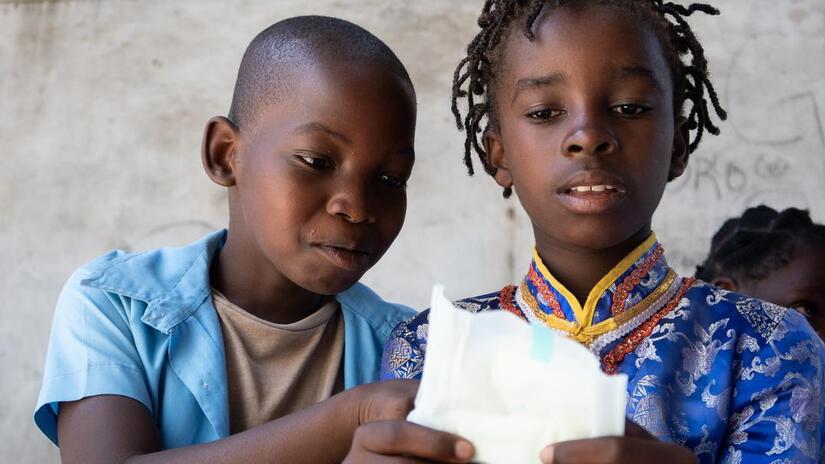Around the world, millions of women and girls* face stigma, exclusion and discrimination simply because of one perfectly natural bodily function: their periods.
Negative attitudes and misinformation about periods limit women and girls’ potential. Too often they miss out on education and employment—either due to a lack of hygiene facilities and products to easily go about their daily lives while menstruating, or because they are weighed down by fear of shame and embarrassment from their communities.
Women and girls’ safety is also at risk. Without proper hygiene facilities, women can be forced to go into the open to deal with their period needs—leaving them exposed to physical danger and psychological harm. And in extreme cases, period stigma has tragically claimed women and girls’ lives.
At the IFRC, #WeAreCommitted to challenging period stigma, exclusion and discrimination and to improving the menstrual hygiene management (MHM) knowledge, skills and programming of our National Societies.
We’re working to raise MHM standards across our network—both as part of our long-term water, sanitation and hygiene (WASH) programmes, but also during emergency response. Because periods don’t stop in an emergency!
We focus on three main areas:
- Providing pads and menstrual health items as part of our relief assistance
- Community engagement to demystify periods, educate women and girls on how to manage them safely, and challenge negative attitudes—especially among men and boys. This also involves advocating for more and better MHM activities with governments.
- Setting up WASH facilities designed with the additional needs of menstruating women and girls in mind.
Many of our National Societies are already doing fantastic work in this area. Let’s look at some of them!
Lebanon
With support from Elrha’s Humanitarian Innovation Fund, the Lebanese Red Cross has partnered with the IFRC, British Red Cross and consulting firm ARUP to develop inclusive and MHM-friendly latrines and bathing/laundering facilities. They focused on women living in informal tented settlements near the Syrian border.
Speaking to women in the settlements, Lebanese Red Cross teams learned that women mainly use disposable pads during their periods, or a cloth in an emergency, which they burn after a single use. Women explained if they had a safe, accessible and private space to use that was separated from men’s facilities and had discrete disposal methods, they would put their used pads in the bin.
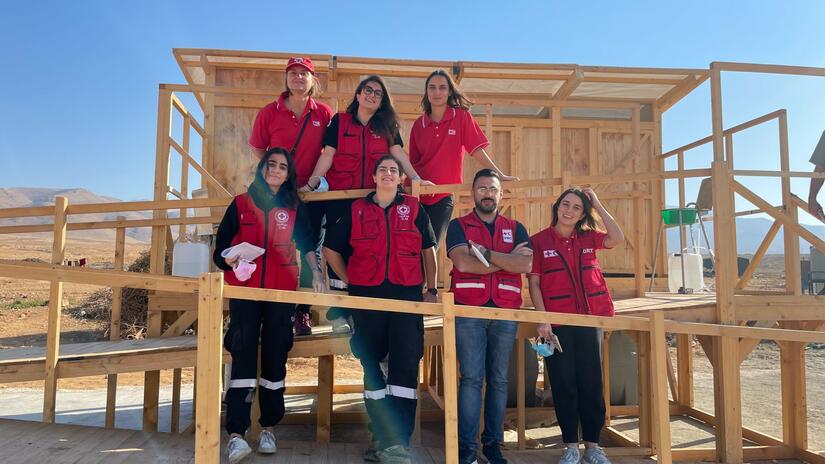
Lebanese Red Cross and IFRC WASH staff stand in front of newly designed latrines, specially built to meet the needs of menstruating women and girls and people with disabilities
Photo: IFRC
Based on this feedback, the Lebanese Red Cross piloted technical designs for emergency WASH facilities that took these women’s needs into account. They developed a manual that can be adapted and used by other National Societies and partners—which includes recommendations of how to best engage with women and girls about their period needs in a sensitive and effective way. Click here to read more about the project.
Pakistan
Although menstruation is considered natural and a sign of maturity for women in Pakistan, it’s also seen as dirty, shameful and something to be dealt with in silence. Men are generally responsible for deciding on the menstrual health facilities and services offered to women and girls, but rarely involve or consult them on their needs.
The Swiss Red Cross worked with Aga Khan University in Pakistan to set up special MHM corners within hospitals—safe spaces in which women and girls could receive information and counselling about menstrual hygiene and reproductive health. They ran pad-making sessions with men and women to raise awareness of good hygiene practices. And they identified influential ‘MHM champions’ who are now spreading this knowledge and tackling period stigma within their communities.
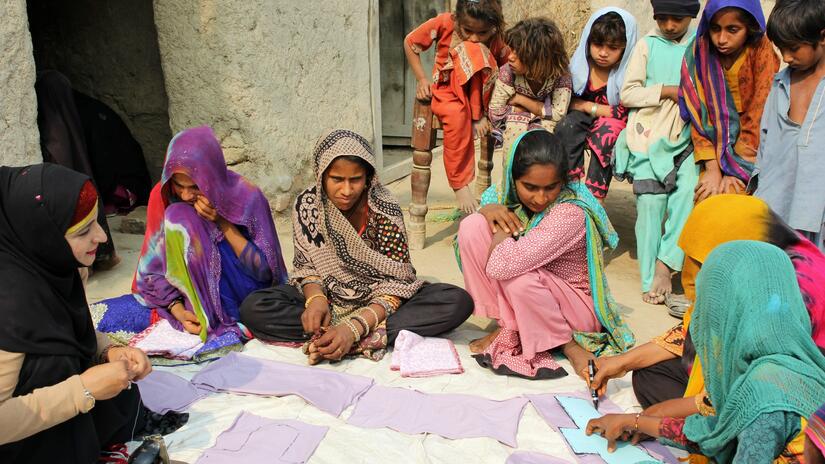
A group of young women in rural Pakistan take part in a pad-making session organized by the Swiss Red Cross and Aga Khan University in Pakistan
Photo: Swiss Red Cross
Malawi
For many girls in Malawi, managing their periods continues to be a challenge due to a lack of access to information, sanitary products, and adequate WASH facilities—particularly in schools.
The Malawi Red Cross Society, with support from the Swiss Red Cross, conducted mixed-method research with more than 500 school students to understand girls’ and boys’ knowledge, attitudes and practices around periods.
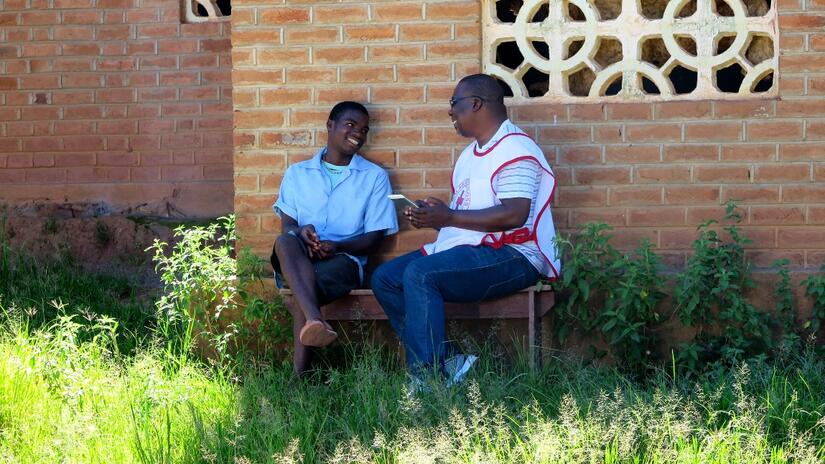
A Malawi Red Cross volunteer speaks to a teenage boy to understand his perceptions and knowledge around periods, as part of a joint research project with the Swiss Red Cross
Photo: Swiss Red Cross/Daniela Enzler
They discovered that:
- More than half of the girls they spoke to had never heard about menstruation before it started
- Girls with increased knowledge used better MHM practices and skipped school less
- Interestingly, boys’ increased knowledge about MHM was associated with higher levels of teasing, and with more absenteeism of girls during their periods
The Malawi Red Cross Society has since used this research to inform their work in MHM so it better meets girls’ needs. They’ve constructed female-friendly toilets in schools, produced reusable menstrual hygiene products, delivered training to teachers and parents’ groups and advocated for more menstrual health activities at the community and district level.
Argentina
During the COVID-19 pandemic, transgender people in Argentina were found to be having difficulty accessing menstrual hygiene items. In close coordination with two local specialist organizations which support and advocate for transgender people, the Argentine Red Cross distributed hygiene kits which included sanitary pads, tampons and menstrual cups.
Transgender men provided recommendations and selected appropriate menstrual items for the kits. Distribution of the kits was accompanied with virtual workshops on sexual health and correct use of menstrual cups. The Argentine Red Cross also set up a health advisory line to offer psychosocial support to anyone who needed it.
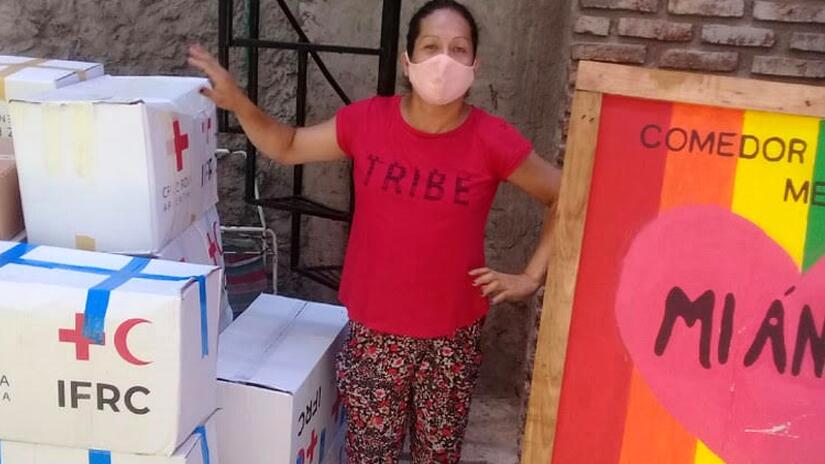
A friendly Argentine Red Cross volunteer hands out menstrual hygiene supplies as part of a special project to support the menstrual health needs of transgender people who may otherwise struggle to get a hold of suitable supplies
Photo: Argentine Red Cross
Learning resources and more information about MHM:
- Discover even more case studies from our National Societies’ MHM activities in this collection
- Explore our wealth of practical guidance, tools and advocacy resources on menstrual hygiene on our dedicated WASH site here
- Visit the dedicated WASH page on the IFRC website
- Visit the global Menstrual Hygiene Day campaign page for more information about this year’s theme
- Contact our Senior Officer for WASH in Public Health, Alexandra Machado, for any MHM-related questions: [email protected]
--
*We recognize that not everyone who menstruates identifies as a woman, and that not all women menstruate.

